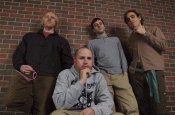
108 decided to answer some questions in textual form for us in anticipation of the band's first full-length in over a decade: A New Beat from a Dead Heart.
The band has been quite busy the last few years despite breaking up about a decade ago, having reformed in August 2005, releasing a 2-disc discography set on Equal Vision about a year later, following it up with the self-released Oneoheight demo EP later that year, signing to Deathwish this past January, and completing the recording of their new album this past February. Deathwish will release the full-length June 27th.
If I'm not mistaken, I read somewhere that some of the guys no longer practice Krishna, but it's quite clear there are still some rather spiritual underpinnings, and that's not just the imagery -- which makes for beautiful artwork (as on the Oneoheight demo/EP), I might add. Collectively you must be continuously inspired by it even if there are some individual members who don't necessarily practice it? 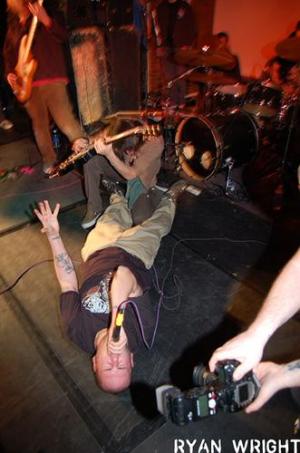 ROBERT FISH: The spiritual aspirations and inspirations remain similar but the external and social aspects have changed dramatically. Our views and inspirations certainly can't be defined by a specific theology and/or religious movement. At the start of the band we were all at a similar starting point in terms of our inspirations with Gaudiya Vaisnavism, which included involvement with the whole Hare Krishna institution, but since that point we have all evolved in very different ways.
ROBERT FISH: The spiritual aspirations and inspirations remain similar but the external and social aspects have changed dramatically. Our views and inspirations certainly can't be defined by a specific theology and/or religious movement. At the start of the band we were all at a similar starting point in terms of our inspirations with Gaudiya Vaisnavism, which included involvement with the whole Hare Krishna institution, but since that point we have all evolved in very different ways.
Even during the initial period of the band the context of how the whole Hare Krishna thing played into our personal lives was very different. Over the years as we have individually removed ourselves from the Hare Krsna movement, in different degrees and for different reasons, as we have certainly continued to evolve in how the inspirations we derive from Gaudiya theology plays within our lives. So there is no set practice or theology that defines the band.
VIC DiCARA: The "supernatural," the "occult," the "spiritual," the "faerie," the "mysterious great BEYOND" was always my main obsession in life since my earliest memory.
I tried to see if it had any connection to Church, and it didn't.
Hardcore exposed me to Hare Krishna. The mysterious version of that spiritual path "clicked" for me in many ways; Although my 8-year journey through the social institutions of "Hare Krishna" led me to realize that religion as a specific external set of social and personal regulations was not what turned me on.
Those 8 years passed as a celibate initiate who also played in a punk-rock-metal band ("108") while also translating esoteric Sanskrit scripture into modern English, running a school for such study, and even spending a year or so as the "president" of a large temple in New Jersey.
That was all quite some time ago now…not coincidentally it was 8 years ago that it ended. I now find myself a more "spiritual" person than ever.
I have very low tolerance for organized religion, especially those from the Judaic/Western stem. I do love to digest Pagan concepts, Buddhist concepts, and Shinto concepts, but my main love is a very esoteric Hindu path, which conceives of the Divinity as a Dual being embodying transcendental eros.
TRIVIKRAMA DASA: I try and practice being conscious of Krsna to the best of my ability. I try and chant Hare Krsna, sometimes go visit a temple, but mostly I try to have an inner dialogue with Krsna going as much as possible. When I find myself in troubling circumstances, which I seem to often, I ask Krsna to please help me. I don't know how Krsna will help me but I can sometimes sense a presence. There are so many things I will never fully understand, that I sometimes try not to try and understand but rather recognize complexity and just be aware of my own insignificance. My practice of Krsna consciousnesss has a lot to do with my emotions and prayers.
That element of the band always seemed like a rather strong conviction. Why the slight falling out? ROBERT: I don't know that it is as much about a "falling out" as our personal evolutions. At the root our aspirations remain much the same if not a bit more specific, matured and deep. One of the dynamics of 108 that I think is/was most misunderstood is that it wasn't meant to be a vehicle to present a specific ideology rather express the emotions, feelings and points that resonated with us in our experiences with a theology we all felt inspired by. That is still very much at the heart of 108.
TRIV: I have always been really glad to play music with these bunch of guys who have found themselves on a spiritual search. I really respect that, and the individual ways that spiritual search exists for each member of 108.
Prior to the original reformation in 1993, I felt like the music was heavily anchored by a somewhat more -- I don't want to say sludgy, but I don't know if "alt" is the right term either -- type of Helmet/Quicksand-type metal. Then when you got back together that first time, you suddenly had added a heavily metallic flair to `80s-inspired hardcore that had rarely if ever been done like that to that point. What direction does A New Beat from a Dead Heart head in, if either? VIC: I feel that this new record is a reflection of the band: diverse. I don't feel it strikes out in any single, simple "direction," it moves 108 forward on all its fronts and facets.
TRIV: A New Beat from a Dead Heart is kind of the next natural progression from Threefold / Curse of Instinct. There is quite a mix of influence as everyone in the band contributed to the songwriting process this time. I found it a real joy to write songs with Rasaraja (Robert) this time around, and feel that the collaboration process yielded very interesting results with a variety of emotion, and musical voice. 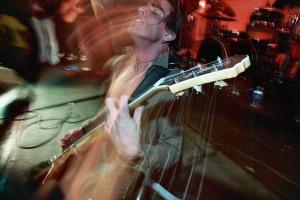 ROBERT: Musically I would say the base elements are still similar but the sound has obviously evolved. In some respects I think the Threefold Misery LP and Curse of Instinct EP hint at what we sound like today but I wouldn't say that the new record sounds like one we would have made right after those records if we hadn't broken up.
ROBERT: Musically I would say the base elements are still similar but the sound has obviously evolved. In some respects I think the Threefold Misery LP and Curse of Instinct EP hint at what we sound like today but I wouldn't say that the new record sounds like one we would have made right after those records if we hadn't broken up.
The new record is a bit more raw than past records and is much more of a collective creation musically, lyrically and sonically. All in all I think, especially emotionally, it is the heaviest record we have ever created.
How much of the material would you say was originally conceived a decade ago, just before the breakup? Were there any ideas or even riffs that have been sitting around for a long time and finally receive life on A New Beat? ROBERT: Well, some of the songs that appeared on the limited edition demo were conceived before the break-up, but in regards to the new LP all of the material is brand new. Our entire writing process has changed dramatically so to use older songs or ideas would be difficult, as I don't know that it would sound or feel organic to the new songs.
VIC: None, really. On the recent demo we had some of that type of material, in "Path of Truth," "Ashes Dust," and "Strength or Fear" -- but none of those made it onto A New Beat from a Dead Heart.
Equal Vision released the discography set last year but they won't be putting out the new album, obviously. Certainly Deathwish is a more clear fit for you and I'm sure you and [owner Jacob Bannon] go back quite a few years. However, EV still does sign the occasional hardcore band these days (Modern Life Is War, Betrayed, and I know they were in talks with Champion for a long time); what ultimately made you decide you didn't want to be a part of that? VIC: I have a lot of respect and love for [owner Steve Reddy] at EVR for doing the amazing things he did with his record label. Nonetheless, they just weren't taking us seriously as a band at all. They were thinking of us as a "reunion" -- Deathwish knew differently and we felt it right from the start.
ROBERT: Really it was the right move for all involved (108, Deathwish, Inc. and EVR). The move allowed us to work with a label more in tune with who and what we are today. Deathwish, Inc. has been absolutely incredible from the get-go and we couldn't be happier with our decision to work together.
TRIV: It was nice working with Steve at times, but although being a great person that I appreciate on a personal level, he just didn't seem so into fostering the new creative spirit of 108 and contributing to its future. That's just how it goes.
I'd imagine several if not all of the band's members currently hold down families and full-time jobs. Do you find it harder to balance that against touring these days than it was in your formative years? 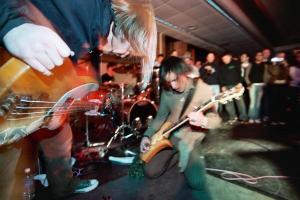 ROBERT: Yeah, we all have careers, some of us families and we all live in different parts of the country so we have to be creative in terms of how we write, tour and play. Personally I think that dynamic also plays into the music and lyrics in a powerful way. The spiritual, ethical, emotional, political and intellectual underpinnings are much more poignant as a 30-something-year-old with a family than it is as a young kid with no real responsibilities. For myself punk music is much more poignant to my life today than it ever was before. At least socially, politically and intellectually it is much less theory based and now more based on everyday experiences.
ROBERT: Yeah, we all have careers, some of us families and we all live in different parts of the country so we have to be creative in terms of how we write, tour and play. Personally I think that dynamic also plays into the music and lyrics in a powerful way. The spiritual, ethical, emotional, political and intellectual underpinnings are much more poignant as a 30-something-year-old with a family than it is as a young kid with no real responsibilities. For myself punk music is much more poignant to my life today than it ever was before. At least socially, politically and intellectually it is much less theory based and now more based on everyday experiences.
VIC: I wish I could say I was "holding down" a family -- I think saying I am being tossed around by a family [is more accurate]. I have two boys and that is just a ridiculous concept that I can't believe I got myself into ;-). The short answer is "yes, of course it's ridiculously harder to do the band in the situations we are in today." I love when younger hardcore kids think that an older band is "cashing in" -- maybe some of them are, but I think for most people at my stage in life, you lose more cash than you gain by trying to do something artistic that you love to do.
TRIV: When I toured with 108 in the mid-nineties it was easy to just get up and go. These days I am a music therapist with a lot of responsibilities, clients, etc., so it can be hard to schedule the touring. Fortunately Rasaraja is really our manager and seems to always be able to help balance our work duties and finding good times/places to tour. So we are in good hands.
What do you think Kurt Ballou was able to accomplish with you that you haven't with past producers? VIC: He wore a toga and let me borrow his rhinestone sunglasses. That is significant. First we worked with Don Fury on Songs of Separation. That was nothing special, honestly. Then we worked with Brian McTernan on Threefold Misery. Brian was able to weather our eccentricities and record amazing tonalities that fit the songs just perfectly. Ten years later, our eccentricities have only gotten more wild, and Kurt Ballou really had a ridiculous challenge on his hands managing us and dealing with our all-over-the-board type of creativity and non-conventional approach to recording. Kurt really bent over backwards and gave so much more than we paid him for. He put a lot of heart into helping us make this work and he's become a good, true friend.
TOM HOGAN: Kurt's an incredible engineer and person, but he primarily took a less hands-on approach to the band with this recording simply because our creative methods were quite contrary to his in many ways. So much so, in fact, that he told us his approach is going to be quite different next time we record with him.
ROBERT: Hard to say really. We loved working with Kurt. We had 6.5 days to travel to Salem, settle in, finish writing and finalize our songs, record and mix everything, which was a bit of a challenge. Kurt really facilitated the creative process by not getting stressed out on time and just letting us do our thing. We don't do things in a very conventional manner so it did take Kurt and us some time to get to a point where we were both understood where each other was coming from but Kurt was always fluid and supportive. Much like our work with Brian McTernan in the past I think if we work together in the future we will really hit our stride together.
TRIV: Kurt Ballou was awesome to work with. We had very differing opinions on a lot of things, so it was interesting to be bold about our sound objectives with a man with a very different set of music tastes/standards. The fact that Kurt is so punk rock made the experience excellent even though we may have disagreed on certain choices, especially in terms of arrangement, timing, sounds, and other things. Kurt Ballou is rad.
The "supernatural"…the "mysterious great BEYOND" was always my main obsession in life since my earliest memory. I tried to see if it had any connection to Church, and it didn't. (Vic DiCara)
What are some influences you found seeping into the writing/recording of A New Beat that weren't previously prevalent? VIC: Political frustrations with Bush and American Culture in general. Spiritual concepts applied to more "everyday" social situations.
ROBERT: I would agree with Vic. I also wanted to tackle aspects of 108 that I felt have been misunderstood primarily in terms of the whole idea of spirituality verse religion which I did in the first two songs ("Declarations on a Grave" and "Guilt"). Otherwise the record is simply about articulating what we are experiencing and feeling.
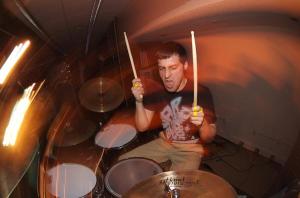 Sonically I would say it really is a product of the environment. We came into the studio with shells for 17 songs that were written by the 4 members. We had the opportunity to play around with some of these ideas as a group before but some of them we have only heard from demos that we were sending to one another. As we started to finish writing and arranging everything we all worked to find our place within each song. As a band we are much more concerned with the feel of a song or recording than we are in how clean or clinical something is. This was the most spontaneous of any past records which I think makes it more raw, intense and emotional than anything we have done before.
Sonically I would say it really is a product of the environment. We came into the studio with shells for 17 songs that were written by the 4 members. We had the opportunity to play around with some of these ideas as a group before but some of them we have only heard from demos that we were sending to one another. As we started to finish writing and arranging everything we all worked to find our place within each song. As a band we are much more concerned with the feel of a song or recording than we are in how clean or clinical something is. This was the most spontaneous of any past records which I think makes it more raw, intense and emotional than anything we have done before.
TRIV: I think we are all evolving people, really people striving to improve ourselves. I think the subtle influence of that fact seeped into the record. I know I am a person capable of experiencing a lot of raw emotions. I say capable because as I get older I realize that it is an amazing thing to be able to sit with your feelings, even when they are very difficult, without numbing out. I think you can hear such emotions in the music we created.
TOM: In my experience with 108, the process of writing and recording both center around group interaction, so therefore my biggest influences are Vic, Triv, and Rob, and specifically our feelings at that particular moment in time.
Do you keep up with current hardcore much? What are some current acts from the field impressing you, or maybe can you give your thoughts otherwise on the American/international community? ROBERT: I really like Rise and Fall, Look Back and Laugh, the Hope Conspiracy, Never Healed and Sweet Cobra. I also dig some older bands such as Lifetime and the (International) Noise Conspiracy.
As far as the scene goes it is all cyclical. I am looking for more bands that put their heart and beliefs on the line whether it is politically, socially or personally and the bands above do that for me. As a 34-year-old it can be hard to relate to a band of kids who are expressing what they are going through. I may be able to relate it to my past but in terms of what I am experiencing now as a parent and things like that it is a bit hard. One record, although it is a few years old, that really hit home with me was by Desaparecidos [2002's Read Music / Speak Spanish].
TOM: I'll get behind any progressive-minded band, regardless of genre.
VIC: I am very into Lion of Judah and another favorite new band of mine is Rise and Fall. Otherwise I don't listen to much new hardcore. Honestly it's not just the songwriting that doesn't interest me, but the modern production of hardcore records is just so thick and maxed out that I simply find it tiring on my ears. I prefer Underdog, Bad Brains, Void, etc. when I am in the punk mood -- or for metal I'd rather hear Slayer or the Deftones, etc.
TRIV: I enjoy checking out what bands are doing when we play with them, or listening to the occasional record or CD that a friend might show us. I think my friend Justin's band Mind Eraser is interesting to check out. Wisdom in Chains was cool, especially this super poppy song that they play. Lion of Judah are a great bunch of guys. I loved seeing the Evens a few weeks back. i enjoyed seeing Reagan Youth, with their new singer. I saw Danzig a year or two ago doing Misfits songs, that was cool. I loved seeing Rollins Band a few months back. They were awesome. And Rollins doing Black Flag, and Ramones songs a few 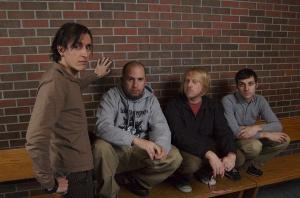 years back. I really do still love some of the hardcore from the early eighties. Die Kreuzen was rad, Samhain… Probably my most favorite band is PIL with Keith Levine and Jah Wobble. I saw Jah Wobble a few years back and was floored. He is amazing. I guess this is off-topic and may not be what you consider "hardcore," but I mostly like stuff that is fresh, unique, has the punk attitude, stuff that has a timelessness about it, that you can enter into its depths whether it is old or new.
years back. I really do still love some of the hardcore from the early eighties. Die Kreuzen was rad, Samhain… Probably my most favorite band is PIL with Keith Levine and Jah Wobble. I saw Jah Wobble a few years back and was floored. He is amazing. I guess this is off-topic and may not be what you consider "hardcore," but I mostly like stuff that is fresh, unique, has the punk attitude, stuff that has a timelessness about it, that you can enter into its depths whether it is old or new.
What kind of future do you see with this reformation? ROBERT: Well, we are currently planning shows around the U.S. and Europe that will take us through 2007. Next year will include more dates around the U.S. and Europe as well as dates in Japan and South America. Most importantly we will begin writing and recording a new record for Deathwish, Inc.
VIC: We will transform into robotron Pokémon and infiltrate children's cartoons to brainwash them with Radharani-Krishna propaganda, and thus we will plot to annihilate the current materialist, conformist, non-feeling way for social existence.
TRIV: There is a lot more music I think for 108 to explore. I am ready to record the follow-up to A New Beat from a Dead Heart, and already have a few songs, and a bunch of riffs ready to go. Hope it will get better and better.